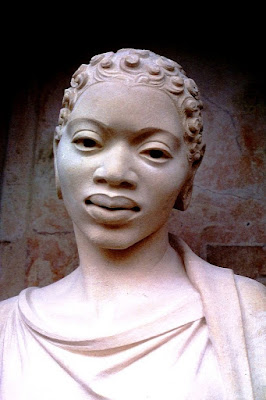Good Tuesday morning, comrades of The Remains of the Epiphany. There are three bright lights on the calendar of Lesser Feasts and Fasts, one of whom also provides a lesson for us today during Black History Month.
That would be Manche Masemola, who shares the date with Dietrich Bonhoeffer and Cornelius the Centurian. Today, I'm going to highlight the life of this South African woman described as a "Christian Martyr" who died at the hands of her parents for the persistence of her vocation.
Manche (1913–1928) was of the Pedi people, a Bantu ethnic group in South Africa who are known for their music, storytelling, and dance. She lived her short life to the northeast of modern Johannesburg, with her parents, two older brothers, a sister, and a cousin.
After tribal warfare, it was determined that the Pedi people were to be confined to reserved lands that were barren, and they worked hard to eke out a living there. A tiny Christian community had been formed, first by German and then British missionaries, which was widely viewed with anxiety and suspicion by those among the Pedi who adhered to the faith and customs of their forebears.
In 1919, Manche and her cousin Lucia began taking classes to prepare them for baptism at the Anglican Community of the Resurrection mission. They did so against the strenuous objection of Manche's parents, who feared the girls were being bewitched, that they would leave them, or worse, refuse to marry and continue the customs of the Pedi people.
What were good Pedi parents to do? Especially those who bore legitimate resentment and anger at the British colonists who had segregated them and feared (not without good cause) that the girls would leave their family and traditions and become "Westernized". They saw that the missionaries were the vehicles of colonialism, imperialism and empire, which they experienced as a poisonous triple cocktail to kill their culture.
The parents took Manche to a traditional South African healer, who prescribed a traditional remedy, which her parents made her consume by beating her. Indeed, she was beaten so badly that Manche remarked to her cousin Lucia and her priest that she feared she "would be baptized in her own blood." That turned out to be prophetic.
The mother hid the girl's clothes so she could not attend Christian instructional classes, to no avail. On February 4, 1928, her parents led the teenager to a lonely place, where they killed her, burying her by a granite rock on a remote hillside. She was thought to be about 15 years old.
I don't know about you but I hear multiple layers of tragedy in this story. I also hear echoes of the story of Abraham's sacrifice of Isaac, except there was no dramatic, last minute divine intervention to spare the life of Manache.
A statue of Manche Masemola is one of the ten in the Modern Martyrs of the 20th Century collection adorning Westminster Abbey’s Great West Door. I suspect many see her as a martyr to the Christian faith, an example for all Christians to be steadfast and willing to die for the teachings of Christ.
When I visted the Abbey years ago and saw her statue, I was awash with the sense that Manache is not so much a Christian martyr as a martyr not to the teachings of Jesus but, rather, to the use of Christianity as a tool - a weapon - of colonialism, imperialism, empire and cultural genocide.
I find the juxtaposition of her story with that of the stories of Cornelius the Centurian, the first Gentile to be converted to Christianity, and Dietrich Bonhoeffer, who was martyred by Christian Nationalists in Germany who used their religion as a tool of fascism and genocide, to be a testimony to the evil corruption of the original intent of evangelism.
The three, indivually and together, shine a bright light in which we can examine more closely our beliefs and faith in the True Light of Jesus, who is the vehicle of our ongoing epiphanies and revelations. This has become a spiritual task of critical importance for us in our day and time.
I hope something good happens to you today.
Bom dia.
NB: I wish to point out the obvious - that I am a woman who is Caucasian, Western, and a Christian liberation feminist, who comes from the strong Roman and Anglo Catholic roots of American immigrants who is retelling this story through those particular lenses. I have no doubt my perspective will differ from some Citizens of the Realm, as well as American Christians and even, perhaps, some South Africans. This is my epiphany, my revelation. I trust I have shared my reflection with respect. If your reflection differs, please share it with the same respectful intent. Thank you.

No comments:
Post a Comment